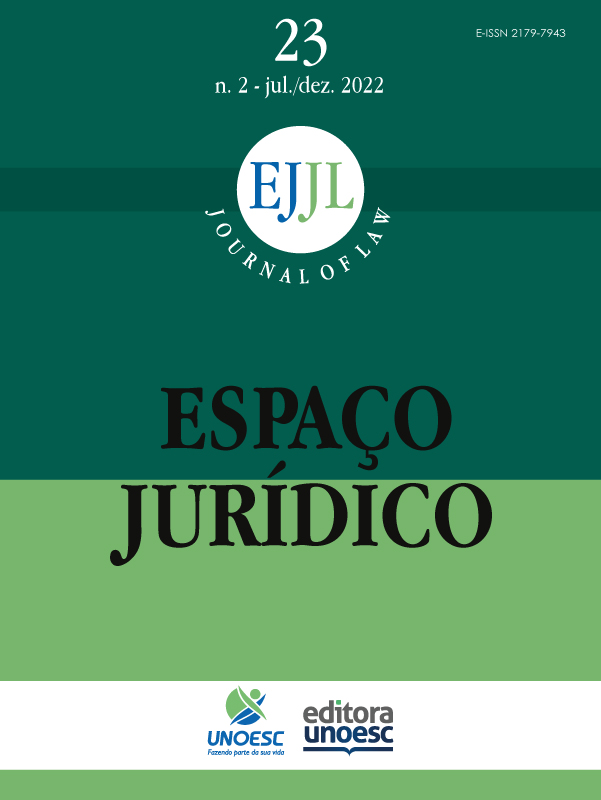Personality, sexuality and violence: problematizing fundamental rights of our civil life from Westworld
DOI:
https://doi.org/10.18593/ejjl.29937Keywords:
Personality Rights, Sexuality, Violence, Westworld, Fundamental Civil RightsAbstract
The article discusses fundamental civil rights, such as personality rights, sexuality and protection and non-violence rights, based on the film series Westworld, interrelating facts and situations that support the notion of humanity, essential for the modern conception of the subject of law and their basic personality rights, with digital technologies and problems involving Bioethics and Biolaw. At first, it presents the argument and context of the first season of the series. Afterwards, based on the plot, there is a debate about what constitutes us as humans and the limits of our consciousness. Finally, it extracts possible problematizations for the debate about our personality, sexuality, and corporeality rights. It makes use of a qualitative research of bibliographic review, film analysis and critical comparison, to contribute to the problematization of these fundamental civil rights.
Downloads
References
ALVES, R. S. O Medo em Westworld. Trabalho de Conclusão de Curso. Universidade Federal do Paraná. 2018.
AMORIM, H. M. & CARDOSO, R. C. O ciborgue no limiar da humanidade: redefinindo a pessoa natural. Rev Bio y Der. n. 46, p. 67-84, 2019.
BAUMAN, Z. Medo Líquido. Rio de Janeiro: Jorge Zahar, 2008.
BORRILLO, D. Prefácio: Pensar Juridicamente a Sexualidade. MONICA, E. F.; MARTINS, A. P. (org.). Qual o Futuro da Sexualidade no Direito? 1. ed. Rio de Janeiro: Bonecker/PPGSD-UFF, 2017.
BIONI, B. R. Proteção de Dados Pessoais: a função e os limites do consentimento. Rio de Janeiro: Forense, 2019.
BOSTROM, N. Transhumanist values. In: ADAMS, Frederick (org.). Ethical Issues for the 21st Century. Charlottesville: Philosophical Documentation Center Press, 2005.
BOYD, D. & CRAWFORD, K. Critical Questions for Big Data. Information, Communication & Society, n. 15, v. 5, p. 662-679, 2012.
BRUNO, F. A economia psíquica dos algoritmos: quando o laboratório é o mundo. NEXO Jornal, Brasil, 12 jun., p. 1-3, 2018.
DONEDA, D. Da privacidade à proteção dos dados pessoais. Rio de Janeiro: Renovar, 2006.
FLAUZINA, A. L. Pinheiro; PIRES, T. R. O. (org.). Rebelião. Brasília: Brado Negro, Nirema, 2020.
HARAWAY, D. J. Manifesto ciborgue: Ciência, tecnologia e feminismo-socialista no final do século XX. In: SILVA, T. T. (org.). Antropologia do ciborgue. Belo Horizonte: Autêntica, 2000, p. 33-118.
HUXLEY, J. Transhumanism. Journal of Humanistic Psychology, vol. 8 n. 1, p. 73-76, 1968.
KANT, I. Fundamentação da Metafísica dos Costumes. Lisboa: Edições 70, 2007.
LIMA, L. L. G. Cultura do Estupro, Representações de Gênero e Direito. Language and Law / Linguagem e Direito, Vol. 4, n. 2, p. 7-18, 2017.
MONICA, E. F.; MARTINS, A. P. A. (org.). Qual o Futuro da Sexualidade no Direito? 1. ed. Rio de Janeiro: Bonecker/PPGSD-UFF, 2017.
PARSELIS, M. Tecnologías Entrañables como Marco para la Evaluación Tecnológica. Tese de doutorado. Universidad de Salamanca, 2016.
PLATÃO. A República. Lisboa: Fundação Calouste Gulbenkian, 2017.
RICHARDSO, R; SCHULTZ, J. M.; CRAWFORD, K. Dirty data, bad predictions: how civil rights violations impact police data, predictive policing systems, and justice. New York University Law Review. Vol. 94, n. 192, mai., 2019, p. 193-233. SAFFIOTI, H. I. B. Gênero, patriarcado, violência. São Paulo: Fundação Perseu Abramo, 2004.
VAN RIPER, A. B. Sciente in popular culture: a reference guide. Westport: Greenwood Prees, 2002.
VERNA, S. Ideias Geniais: Os principais teoremas, teorias, leis e princípios científicos de todos os tempos. 2. ed. Belo Horizonte: Gutemberg Editora, 2012.
VIGARELLO, G.; MAGALHÃES, L. História do estupro: violência sexual nos séculos XVI-XX. Rio de Janeiro: Jorge Zahar, 1998.
WEST, S. M. Data Capitalism: Redefining the Logics of Surveillance and Privacy. Business & Society, jul., 2017.
Published
How to Cite
Issue
Section
License
Copyright (c) 2022 Eder Monica

This work is licensed under a Creative Commons Attribution-NonCommercial 4.0 International License.
Copyright: All manuscripts submitted become the property of the Unoesc and will not be returned to the author. It is a condition of publication that authors vest copyright in their paper, including abstracts, in the Universidade do Oeste de Santa Catarina - Unoesc. This enables us to ensure full copyright protection and to disseminate the paper to the widest possible readership in print and electronic formats as appropriate. Authors may, of course, use the article elsewhere after publication without prior permission from the Publishers, subject to the terms outlined on the Copyright transfer form.


































